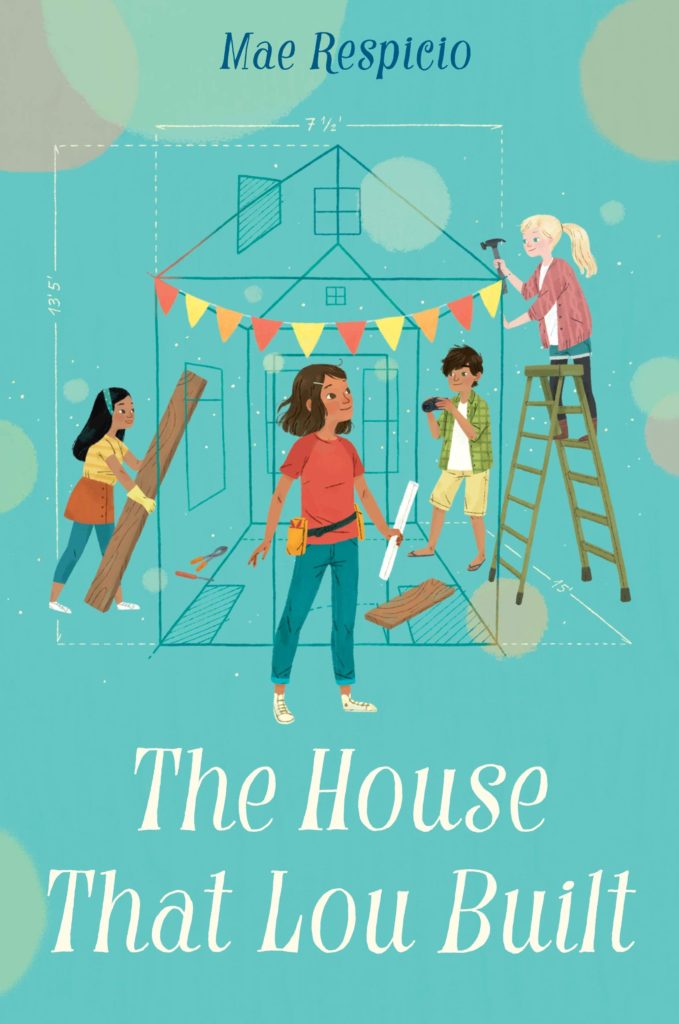Mae Respicio is the author of The House that Lou Built, the 2019 APALA Honor Award in Children’s Literature. Her forthcoming novel, Any Day With You, will be published in 2020. Her books are available through Powell’s Books, local bookstores, or your local library. She is interviewed by APALA member Molly Higgins.
Molly Higgins (MH): Please introduce yourself and briefly describe your literary work and career path to date.
Mae Respicio (MR): Thank you for having me! I’m Mae Respicio, author of the middle grade novels The House That Lou Built, which won the 2019 APALA Honor Award in Children’s Literature, and Any Day With You , which comes out May 2020. I started my writing career long ago in broadcast journalism writing for a news station in Northern California. I went on to hold most writerly jobs you can think of: screenplay coverage writer, copywriter, communications writer, and most recently, editor for a parenting website. I’ve published a lot of nonfiction and I also spent many years managing a creative writing program at UCLA. Eventually I found my passion while doing a PEN USA fellowship in fiction writing. Somehow this all led to…“middle grade author!” I’m happy to be at this point in my writing life; it’s where I feel I’ve found my authentic voice.
MH: Lou and her mother are such wonderful characters. They’re both so passionate and compassionate to each other and the rest of their family. How much are they based on real people and how much of them is fictional?
MR: This book is very much a mother-daughter story, and I love the connection between Lou and her mom, Minda. Neither is based on anyone specific in my life but when I’m exploring characters, I usually borrow from emotions I’ve felt or observations of the people around me. I think it’s natural for authors to infuse details from their lives into their work—it makes for richer stories and more nuanced characters. This is an #ownvoices book for sure, in that like Lou, I came from a large and loving extended Filipino American family. Many details in the setting and family dynamics were inspired by my childhood. I always had cousins coming in and out of my house, too!
MH: Building a house in such a short time with so little experience is an incredible and impossible goal, but Lou’s unshakeable belief in herself and her abilities is something that I love about Lou’s character. What do you hope young readers take away from Lou’s story?
MR: I’m so glad that resonated with you! Building a literal house is obviously an enormous challenge, but Lou has no qualms or hesitation in trying. I get inspired whenever I hear about young people who go for their big dreams so full-heartedly and without any inhibitions—they’re pretty magical that way! I hope Lou’s story will fuel and motivate readers’ creativity.

MH: At one point in the story, the narrator talks about the different titles that characters use to refer to older relatives such as manong and kuya. For me, this description was a lovely reminder of all the diversity we have within Asian American communities. When you’re writing, how do you choose which cultural signifiers (food, dance, words) to explain or not to explain?
MR: I try to give unfamiliar words enough context so that a reader can figure out the meaning even without a glossary. Then if it’s still unclear, I hope the story has made readers curious enough to do some research on their own. I also look at this from a craft-based standpoint. If I’m writing from a Filipino character’s POV, she wouldn’t be over-explaining something in her head. Those cultural signifiers are engrained in her and a part of her everyday life, so when I’m writing in first person, I try to explain them how the character might see them.
MH: Safety and security are strong themes throughout the book. Lou’s mother has to choose between the security of a good job and the security of living near a large, supportive family. At what point during writing the book did you know what her decision would be?
MR: When I started drafting, I didn’t know what Lou’s mom would choose. That was the pantser in me, still canoodling around on my manuscript! But as I dug more deeply into the book’s themes, it felt most true to the characters that Minda wouldn’t want to take Lou away from their close-knit family. So definitely in my first draft, I knew that Minda would do everything she could to have them stay.
MH: How do you think your personal identity influences your writing and/or the diversity of your readership?
MR: Filipina American is one of the main lenses in how I see the world and that inherently influences my writing—I wouldn’t want it any other way. Growing up I never saw myself in the books I read, so I was very conscious of that when I wrote Lou. This novel is basically a love letter to my culture. I wrote it so my sons would have a book where they could recognize a part of themselves, and it’s the book I would have wanted as a kid. Now that it’s out in the world, it’s been a thrill to connect with all kinds of readers, and extra meaningful to hear from Filipino and Asian American readers who’ve told me how much it’s meant to them. One comment I loved (that made me cry!), was from a reader who said she’d never seen herself in a book until mine—and she was thirty-seven years old!
MH: We’re always looking for more to read. What are some books by five authors we should be reading? Why?
MR: Shouts outs to some fellow Pinoy and Pinay novelists, and some of their books that I’ve loved:
I read Marie Miranda Cruz’s debut Everlasting Nora aloud with my boys (something we try to do that every night!). The story is about a girl living in a Manila cemetery and it’s a heartbreaking, uplifting, and beautiful book about poverty and family.
I recommend Jessica Hagedorn’s Dogeaters. Jessica has paved the way for other Filipino authors. I did a residency with her long ago where she was the mentor. I don’t think I’d be writing today if it wasn’t for her rich and powerful work.
I recommend Tif Marcelo’s The Key to Happily Ever After. I love contemporary rom-coms and feel-good books and finally (finally!) there’s one out there based on a Filipino American family and the power of sisterhood.
I’m reading Randy Ribay’s Patron Saints of Nothing. This powerful YA Book is set amidst the drug wars of the Philippines and explores the story of a Filipino American teenager who’s uncovering the truth about his cousin’s murder. I’ve already given Randy’s book to all of my YA-loving nieces and nephews.
Gail Villanueva’s My Fate According to the Butterfly is another book set amidst the realities of Metro Manila and the war on drugs, but it’s for middle graders. It’s a vivid and gorgeous book that opens readers’ eyes to the potential for magic and hope.
MH: You’re being interviewed by a librarian, for an audience of progressive Asian American librarians. What are your thoughts on libraries, and their place in building diverse communities?
MR: Libraries are everything—a safe escape, a loving community, an unconditional home—they absolutely have a place in building diverse communities. My local library was the first place I was able to visit new worlds and step into other peoples’ shoes. What better way to build empathy than that?
MH: What advice would you give young professionals, especially those from diverse backgrounds, who are interested in a career in novel writing (or writing generally)?
MR: Read and write! Learning your craft takes time and practice, so as long as you’re putting pen to page, however that means to you, you’re well on your way. It’s also important to read widely in the genres that interest you to know what works, what doesn’t, and what’s out there. Before I started drafting Lou’s story I did my own little MG bootcamp. I read a bunch of titles, while eating a lot of chocolate and thinking, “How will I ever write a book as good as these?!” It taught me so much about the middle grade voice.
MH: You have a new project set to come out in 2020. What can you tell us about that?
MR: Yes! My next book is called Any Day With You and it comes out May 2020. It’s all about 12 year old Kaia who lives with her family near the beach in Los Angeles. Kaia’s passion is doing special effects make-up. She’s very close to her great-grandfather, who’s lived with Kaia her whole life, and when he decides to return to his homeland of the Philippines, Kaia wants to change his mind. She and her friends enter a film contest, which inspires Kaia’s plan to convince her great-grandfather to stay. This book has the magic of creativity, the power of folklore, and the complexity and joys of family love…and I can’t wait for you to read it!
You can find Mae Respicio on Twitter @maerespicio, Instagram @maerespiciobooks, Facebook, or on the web at maerespicio.com. Sign up for Mae’s Very Infrequent Newsletter here!
Editing assistance provided by Jessica Dai.

